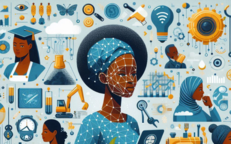Creating A Science Culture To Influence An Innovation-Led And Knowledge-Based Socio-Economic Development In Africa

This is the 27th post in a blog series to be published in 2022 by the Secretariat on behalf of the AU High-Level Panel on Emerging Technologies (APET) and the Calestous Juma Executive Dialogues (CJED)
Aspiration 1 of the African Union's Agenda 2063 envisions a wealthy Africa based on equitable growth and sustainable development through significant human capital investments emphasising science, technology, and innovation (STI).[1] The Science, Technology, and Innovation Strategy for Africa (STISA-2024) positions STI at the epicentre of the continent's socio-economic development and growth.[2] STISA-2024 encourages African countries to strategically pursue STI-enabled socio-economic development to drive Africa's transformation and foster innovation-led and knowledge-based economic growth. This framework also emphasises the impact of STI on socio-economic activities such as water management and purification, natural resources and mining activities, agriculture and food security, and environmental management and conservation, among others.[3]
African countries and cultures have benefited significantly from STI-driven socio-economic development and growth. For example, there have been STI-enabled industrial advancements in infrastructural development, energy generation, manufacturing industry, healthcare, education, information and communication, finance, entertainment, transportation, agriculture, and environmental protection. [4] However, these advancements have not been predominately African-led but rather imported from across the globe. Unfortunately, despite the potential economic growth and development, Africa is still lagging in STI-led socio-economic development and growth because of limited skilled human capital within the continent.[5] The limited skills within the continent have been lost through emigration, known as the "brain drain", to other parts of the world in search of better opportunities.[6] In this way, African countries are missing the possible STI-enabled economic advancement.
Notably, this phenomenon has profoundly resulted in the stagnation of the socio-economic development of the African continent. The limited STI skilled human resources limit African countries' capacity to solve African challenges using localised STI-inspired solutions.[7] Furthermore, Africa's science education curriculum barely provides adequate skills for African children to address everyday realities and challenges but remains abstract and irrelevant.[8] Worth noting that most African countries' curricula remain significantly westernised and colonial and barely localised to enable local solutions for the African people.[9]
The emphasis on the calls has been on African governments revising and implementing their education policies to make education more STI-inclined, thereby improving the culture of science. There have been calls to review the current curriculum to generate graduates with the relevant skills to address African challenges and advance the continent's socio-economic development and growth.[10] The implementation of the STI-inclined policy frameworks can progressively advance technology and innovation in Africa by providing relevant skills that can be used to solve African challenges. This can prevent the ad hoc, and mostly imported solutions that have proven unsustainable once the international partners have exhausted their participation—as such, transferring projects from international development partners to local partners has proven difficult to implement.[11] Amongst a plethora of reasons for the mismatch, unskilled human capital is among the leading causes of such failures.
African countries are encouraged to enhance their investment in technology and accompanying infrastructure. Worth noting is that the global countries that have greatly benefitted and advanced their STI-enabled socio-economic industrialisation have allocated approximately 2.6% of their gross domestic product (GDP) towards their scientific and technological research and innovation. Regrettably, most African nations have undertaken limited investments, resulting in mixed STI-enabled advancements.[12] This can help grow the culture of science in solving African challenges through the appropriate skills and culture of solving societal challenges.
With the rapid growth of African peoples' social, intellectual, and material, the culture of science should be integrated into everyday life. This requires African society to internalise the science culture into their shared traditions and customs. Through these efforts, Africa can socialise their citizenry toward a science culture within their standard enculturation mechanisms to effectively enhance localised technological advancements and innovation.[13] Currently, within the African culture, superstition remains, and failure to investigate challenges and methodically foster scientifically driven solutions. Unfortunately, the imported solutions turn out to be more expensive and exploitative than local solutions. Therefore, this significantly limits the capacity of African countries to advance their economic activity and effectively take care of their citizens.
African countries can utilise the scientifically cultured skilled human capital to develop Africa's scientific basis and dominate the world of STI-enabled development and growth. Notably, the development of science and technology is known to co-evolve with the formation of science culture. Therefore, the African Union High-Level Panel on Emerging Technologies (APET) is advising that African countries should develop a culture of science much earlier in the curriculum to foster the culture of science earlier on in the educational and training programmes. This can be accomplished by funding and strengthening STI-based curricula in African schools. Since STI is key to the African Union's Agenda 2063 towards supporting socio-economic development and growth in Africa, African countries should strengthen their Science, Technology, Engineering, and Mathematics (STEM) skills capacities to produce the necessary skills for STI activities. [14] APET further recommends that STEM skills capacity development be prioritised to support diverse socio-economic activities such as agriculture, food production, product commercialisation, industrialisation, manufacturing, and urbanisation.
APET suggests that African countries should inculcate the culture of science as part of the foundational curricula up to tertiary levels to enable long-term learning and absorption of scientific knowledge. This can be accomplished through STEM literacy within the sciences, numeracy, basic scientific principles, and experiential learning.[15] Additionally, African countries can include scientific approaches to humanities, arts, and social sciences even outside the traditional STEM subjects. This can also help improve STEM subjects by introducing the art component into STEAM.[16] Thus, by incorporating teaching and learning in the science culture as early as the pre-primary education level, African countries can adequately train the next generation of researchers and innovators early enough to solve African challenges through a scientific research approach.[17]
APET notes that through scientific, methodical experimentation and research, African researchers and innovators can address the challenges in the transportation networks, rates of exchange, types of investments, the efficiency of factories, food security and farming challenges. This can also create technologies that can adequately address climate change-related challenges. Therefore, by identifying these challenging issues, Africans can formulate new solutions enabling economic networks to become more diligent, dynamic, and beneficial to all Africans. Furthermore, APET observes that science and technology can contribute to African society by generating new knowledge, which can bolster the continent's socio-economic development and advancement and resolve the various persistent societal issues.
It is worth noting that innovation and technology are developed based on natural philosophy supported by people's intellectual inquisitiveness. However, technological and innovative advancements should be supported by adequate scientific advances in scientific research as so to develop new technological solutions. Furthermore, the various industrial revolutions should be supported by advancing science and technology and linking scientific results to real-life issues to strengthen the impact of technology and innovation. At the same time, science is drifting from being the business of the intellectual world, but the scientific results are currently pioneering the frontiers of socio-economic development and growth. Essentially, science is progressively influencing values and driving the societal progress of civilisation.
Fundamental scientific progress has substantively influenced the sense of values and progressively changed the nature of society itself. Thus, APET is encouraging African countries to encourage the culture of science to enhance the outputs of STI-related solutions in addressing African challenges. For example, the 4th Industrial Revolution is challenging African countries to participate in the developments of various technologies such as computing, machine learning, and advances in artificial intelligence and the internet of things. Additionally, the invention of the internet of things and advances in information and communications technologies are improving people's convenience and modes of behaviour. Consequently, the lives of Africans are progressively being altered to influence the nature of societal dimensions in education, medical and welfare, transport, finance, and manufacturing sectors.[18] Furthermore, material science and nanotechnology advances have enabled the interpretation and manipulation of the phenomena of materials at the atomic and molecular levels. This is helping the globe strengthen its innovation and technological advancement significantly.
In conclusion, APET notes that to accomplish these advancements, African countries should foster a scientific-cultured curriculum within their youth to rapidly influence the diffusion and absorption of skills needed for progressive scientific and technological advancements. The scientific advancement based on indigenous knowledge systems can substantially benefit African society. Notably, their inclusion into the science culture can ensure that African science is localised and easily understood by Africans.[19] However, an enabling environment for such advancements should include changing current restrictions impeding various communities from advancing their STI-enabled socio-economic progression. This includes intentionally and deliberately stimulating and supporting scientific and technological activities such as research and development, STI governance and regulatory frameworks. This can create new technologies, effectively manage STI-related resources, and develop competitive economic advantages.
Featured Bloggers – APET Secretariat
Justina Dugbazah
Barbara Glover
Bhekani Mbuli
Chifundo Kungade
Nhlawulo Shikwambane
[1] https://au.int/en/education-science-technology.
[2] https://au.int/sites/default/files/newsevents/workingdocuments/33178-wd-stisa-english_-_final.pdf.
[3] https://au.int/en/education-science-technology.
[4] https://bscholarly.com/why-is-africa-lagging-behind-in-science-and-technology/.
[5] https://www.un.org/development/desa/en/wp-content/uploads/2020/07/RECOVER_BETTER_0722-1.pdf.
[6] https://www.investopedia.com/terms/b/brain_drain.asp.
[7] https://www.gov.za/sites/default/files/gcis_document/201912/white-paper-science-technology-and-innovation.pdf.
[8] Case, Jennifer & Marshall, Delia & Mckenna, Sioux & Mogashana, Disaapele. (2018). Going to University: The Influence of Higher Education on the Lives of Young South Africans. 10.47622/9781928331698.
[9] https://www.versobooks.com/blogs/4810-colonialism-as-a-system-for-underdeveloping-africa.
[10] David K Evans, Amina Mendez Acosta, Education in Africa: What Are We Learning?, Journal of African Economies, Volume 30, Issue 1, January 2021, Pages 13–54, https://doi.org/10.1093/jae/ejaa009.
[11] https://www.un.org/en/ecosoc/docs/pdfs/fina_08-45773.pdf.
[12] https://businesselitesafrica.com/2021/12/30/4-reasons-why-africa-continues-to-lag-behind-in-technology/.
[13] https://journals.co.za/doi/pdf/10.10520/AJA00382353_6242.
[14] https://au.int/en/education-science-technology.
[15] https://www.interacademies.org/sites/default/files/publication/principles-and-big-ideas-of-science-education.pdf.
[16] Braund, M., Reiss, M.J. The ‘Great Divide’: How the Arts Contribute to Science and Science Education. Can. J. Sci. Math. Techn. Educ. 19, 219–236 (2019). https://doi.org/10.1007/s42330-019-00057-7.
[17] https://unesdoc.unesco.org/ark:/48223/pf0000261445.
[18] https://unctad.org/system/files/official-document/tir2020_en.pdf.
[19] https://journals.co.za/doi/pdf/10.10520/AJA00382353_6242.


